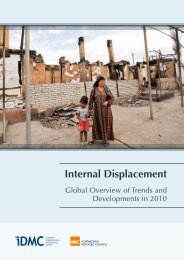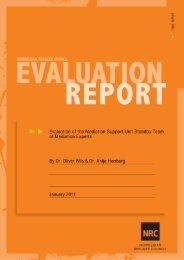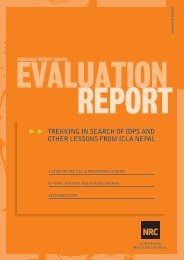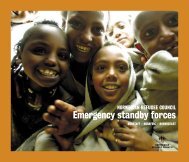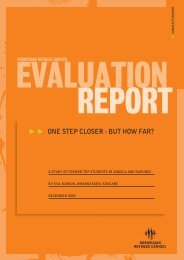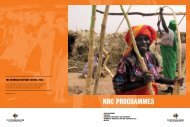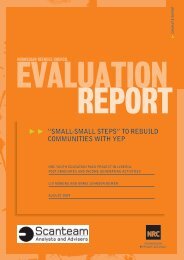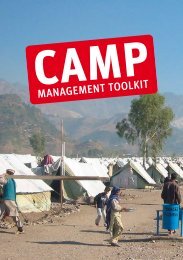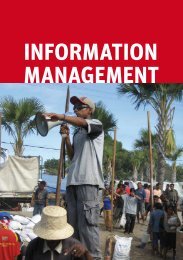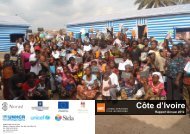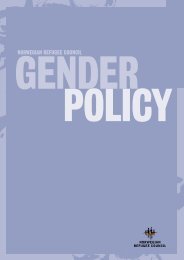approaches through which it can stimulate a debate on transitional issues among therelevant actors <strong>in</strong> Uganda <strong>in</strong> order to br<strong>in</strong>g some coherence to the process .Strengthen<strong>in</strong>g Local Capacities: At an operational level, GFD is build<strong>in</strong>g the capacity <strong>of</strong>local structures (albeit on a limited scale) that are expected to direct future developmentefforts with<strong>in</strong> the community. Whereas it created its own <strong>distribution</strong> structures (the FMCs)which have been accused <strong>of</strong> underm<strong>in</strong><strong>in</strong>g the authority <strong>of</strong> local structures, NRC is<strong>in</strong>creas<strong>in</strong>gly work<strong>in</strong>g with local <strong>of</strong>ficials at the parish level <strong>in</strong> the transit sites and return a reas.Parish chiefs and local council <strong>of</strong>ficials are more <strong>in</strong>volved <strong>in</strong> the <strong>food</strong> <strong>distribution</strong> processesand have been tra<strong>in</strong>ed and equipped with community mobilization and leadership skills 168 .Dur<strong>in</strong>g the first quarter <strong>of</strong> 2008, a tra<strong>in</strong><strong>in</strong>g programme was conducted <strong>in</strong> all sub counties forFMCs, sub-county leaders and some LC members. The tra<strong>in</strong><strong>in</strong>g tackled topics on the roles <strong>of</strong>FMC/LCs, <strong>distribution</strong> processes, role <strong>of</strong> <strong>food</strong> aid dur<strong>in</strong>g return and recovery, hygienepromotion and domestic violence 169 .L<strong>in</strong>kages with Other NRC Programmes: NRC has a portfolio <strong>of</strong> programmes <strong>in</strong>clud<strong>in</strong>gsupport to <strong>food</strong> security & livelihoods (FSL); support to Information Communication andLegal Aid (ICLA); support to Food For Education (FFE), support to Education, <strong>in</strong> particularthe Youth Education Pack (YEP) and support to Shelter and Camp Management. All theseprogrammes have a longer-term perspective that would complement the GFD programme.Interest<strong>in</strong>gly GFD is credited for creat<strong>in</strong>g a special status for NRC, which has <strong>of</strong>fered somelevel <strong>of</strong> protection for the other programmes 170 and yet until recently, there have been noefforts to strengthen the l<strong>in</strong>kages between these programmes and GFD and maximise on this‘good will’.The FSL project which <strong>of</strong>fers a variety <strong>of</strong> livelihood options through agricultu ral production;<strong>in</strong>come generat<strong>in</strong>g activities (IGAs); and environmental conservation, was <strong>in</strong>itiated towardsthe end <strong>of</strong> 2005 with the aim <strong>of</strong> <strong>in</strong>creas<strong>in</strong>g IDPs’ self sufficiency, follow<strong>in</strong>g reductions <strong>of</strong> WFP<strong>food</strong> rations 171 . The programme picked pace <strong>in</strong> 2006. The FSL project targets both NEVIsand EVIs and is today (2008) work<strong>in</strong>g with a total <strong>of</strong> 7613 households <strong>in</strong> Gulu, Amuru andKitgum districts, but would like to expand its target group, as the needs are great. Support t<strong>of</strong>armer groups has so far <strong>in</strong>cluded <strong>in</strong>put provision (seeds, oxen, ploughs) and tra<strong>in</strong><strong>in</strong>g to<strong>in</strong>crease appropriate knowledge and skills. By creat<strong>in</strong>g knowledge on, strengthen<strong>in</strong>g anddevelop<strong>in</strong>g sources <strong>of</strong> <strong>food</strong> and sources <strong>of</strong> cash, the project assists IDPs and returnees tocope with their current situation <strong>in</strong> the short term as well as to ga<strong>in</strong> skills that will benefit themwhile return<strong>in</strong>g to their places <strong>of</strong> orig<strong>in</strong> 172 . The FSL project <strong>in</strong> its current scope is fully fundeduntil April 2009.The number <strong>of</strong> households so far reached by the FSL project appear rela tively small <strong>in</strong> light<strong>of</strong> the high unmet need for livelihoods support <strong>in</strong> the three districts, and hence the need toexpand these <strong>in</strong>terventions. As noted <strong>in</strong> earlier sections, NRC’s GFD and FSL componentscould complement each others’ efforts more than has be en the case, given their common<strong>in</strong>terest <strong>in</strong> <strong>food</strong> security. Apart from a few occasions, the two have to some degree beenwork<strong>in</strong>g <strong>in</strong> parallel. While their approaches to <strong>food</strong> security are somewhat different with theFSL component requir<strong>in</strong>g more technical back stopp<strong>in</strong>g and close monitor<strong>in</strong>g, GFD br<strong>in</strong>gscerta<strong>in</strong> strengths to the table (logistics, mobilization skills, a broad network, regular contactwith, and knowledge <strong>of</strong> communities <strong>in</strong> all sub-counties) some <strong>of</strong> which could be harnessedto <strong>in</strong>form and/ or support expansion <strong>of</strong> the livelihoods’ <strong>in</strong>terventions.168FFL/FFE Quarterly report, April 2008169Ibid170Interview with ICLA, NRC171Based on recommendations from a WFP EFSA conducted <strong>in</strong> March 2005172NRC: Food Security & Livelihoods leaflet48
9.4 Lessons Learnt♦♦♦♦♦Strong and effective leadership is critical for articulat<strong>in</strong>g the l<strong>in</strong>k between relief andrecovery and for galvaniz<strong>in</strong>g early recovery efforts. Lack <strong>of</strong> leadership <strong>in</strong> a postemergency situation creates a sense <strong>of</strong> paralysis amongst actors.In a complex situation such as that <strong>in</strong> <strong>northern</strong> Uganda, the beneficiaries’ perspectivesand needs <strong>of</strong> the communities should be the driv<strong>in</strong>g force to avoid push<strong>in</strong>g people <strong>in</strong>t<strong>of</strong>urther destitution. Needs’ assessments should be the basis for decision-mak<strong>in</strong>g <strong>in</strong>humanitarian situations.There seems to be few and disperse funds available for the much needed recoveryactivities. Availability <strong>of</strong> funds <strong>in</strong> a predictable, timely (more than 6 months) and coherentfashion can improve plann<strong>in</strong>g for recovery and assist <strong>in</strong> implementation <strong>of</strong> usefullivelihoods programmes.Co-operation and close collaboration between the different actors: government/donors/humanitarian agencies/NGOs is critical for successful recovery efforts. At presentstakeholders do not seem clear <strong>of</strong> their roles and responsibilities and this hampers asmooth gear-shift <strong>in</strong>to recovery.Humanitarian organisations work<strong>in</strong>g on the ground have sound knowledge <strong>of</strong> the realitiesand needs <strong>of</strong> the ground and which if pr operly packaged can be used to <strong>in</strong>fluenceprogrammes and policy.9.5 Recommendations♦Strong leadership is needed to facilitate the recovery process. As time passes IDPs areleft <strong>in</strong> a vacuum and the consequences may be difficult to handle. With the resources,capacity and goodwill NRC has <strong>in</strong> Uganda, the organisation should take a lead <strong>in</strong>advocat<strong>in</strong>g for concerted recovery efforts. The current lack <strong>of</strong> leadership from GoU aswell as the humanitarian community should not prohibit NRC from exercis<strong>in</strong>g its mandateand leverage as an <strong>in</strong>dependent, capable and important NGO to move forward and setexamples for the recovery process.♦♦♦NRC should advocate for targeted and needs based <strong>in</strong>terventions. This will imply carry<strong>in</strong>gout research and studies (<strong>of</strong> which some recommendati ons have been made <strong>in</strong> thisreport) so as to have a credible evidence base for future programm<strong>in</strong>g. Time is not <strong>in</strong>anybody’s favour. For every delay a farm<strong>in</strong>g season for the IDPs may be missed.In the current transition from the humanitarian to the recovery phase, NRC should alongside GFD activities engage more widely and strategically <strong>in</strong> Food Security and Livelihoodactivities. Dur<strong>in</strong>g the com<strong>in</strong>g months it should be explored how to maximise the synergiesbetween the GFD team/structure and the FSL programme objectives.If there is limited and unsusta<strong>in</strong>able fund<strong>in</strong>g for livelihoods/self reliance activities NRCshould request advocacy support from the <strong>food</strong> security cluster lead or higher up <strong>in</strong> theUN humanitarian system.49




